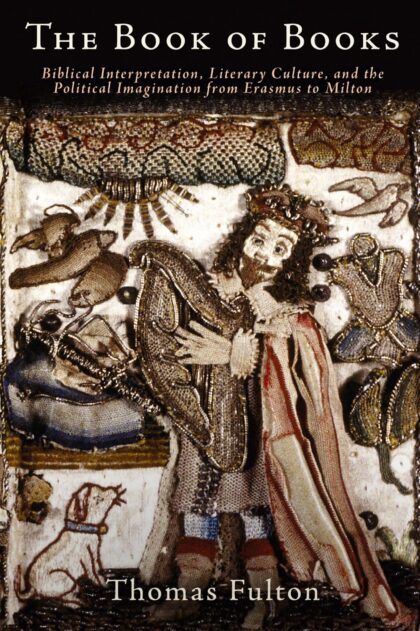Book Reviews
A Review of Thomas Fulton’s The Book of Books
 Over the last two decades, scholars of the literature and history of the Reformations in England have begun to devote more of their attention to the lived experience of religion in the sixteenth and seventeenth centuries. While valuable work on doctrine, theology, and Crown politics has of course continued, interest in object studies, book history, and music has helped to broaden the conversation to include the various sets of practices that constituted the fabric of devotional life. Studies by Alec Ryrie, Peter Marshall, and Alexandra Walsham, among others, acknowledge the conceptual frameworks established by church doctrine, and then proceed to show how these frameworks are upheld, adapted, resisted, and re-envisioned in the lives of early modern English Protestants. This recent scholarship has done a great deal to illuminate the complex texture of religion during and after the Reformations by tracing with precision the relationships between the abstract and the particular or, put slightly differently, between policy and practice. In his fascinating and innovative The Book of Books (University of Pennsylvania Press, 2021), Thomas Fulton adds to these efforts by proposing a novel approach to the subjects of Bible reading and Biblical commentary. What, Fulton asks, can the interpretive strategies actually used by sixteenth- and seventeenth-century Protestant readers of English-language Bibles tell us about Protestant hermeneutics more generally?
Over the last two decades, scholars of the literature and history of the Reformations in England have begun to devote more of their attention to the lived experience of religion in the sixteenth and seventeenth centuries. While valuable work on doctrine, theology, and Crown politics has of course continued, interest in object studies, book history, and music has helped to broaden the conversation to include the various sets of practices that constituted the fabric of devotional life. Studies by Alec Ryrie, Peter Marshall, and Alexandra Walsham, among others, acknowledge the conceptual frameworks established by church doctrine, and then proceed to show how these frameworks are upheld, adapted, resisted, and re-envisioned in the lives of early modern English Protestants. This recent scholarship has done a great deal to illuminate the complex texture of religion during and after the Reformations by tracing with precision the relationships between the abstract and the particular or, put slightly differently, between policy and practice. In his fascinating and innovative The Book of Books (University of Pennsylvania Press, 2021), Thomas Fulton adds to these efforts by proposing a novel approach to the subjects of Bible reading and Biblical commentary. What, Fulton asks, can the interpretive strategies actually used by sixteenth- and seventeenth-century Protestant readers of English-language Bibles tell us about Protestant hermeneutics more generally?
In theory, of course, the answer to this question should be a simple one. Early reformers such as William Tyndale articulated an approach to Biblical…
Please login or subscribe to continue reading.
Please subscribe to The Shakespeare Newsletter to continue reading.
Subscribe Now